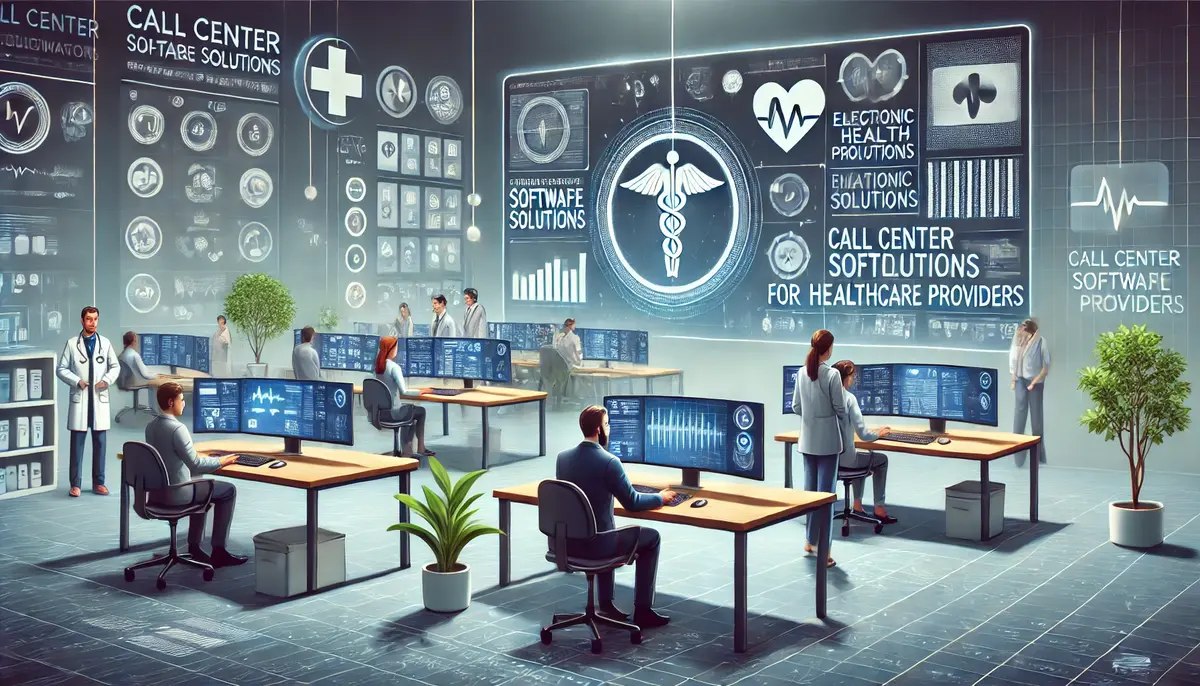Imagine a world where healthcare providers can manage patient interactions with ease, ensuring that no appointment is missed, no question goes unanswered, and every patient feels valued and heard. Interestingly, this is already happening.
With the increasing demand for patient-centric care, healthcare providers must leverage the right tools to enhance communication, streamline operations, and improve patient outcomes.
Call center software solutions specifically designed for healthcare providers are at the forefront of this transformation, enabling medical practices to deliver exceptional service while maintaining efficiency and compliance.
As the healthcare industry continues to evolve, the importance of robust communication systems cannot be overstated. Patients expect timely, accurate, and personalized interactions, whether they are scheduling an appointment, following up on test results, or seeking advice on treatment options.
Healthcare providers, in turn, must ensure that these interactions are managed efficiently, securely, and in compliance with regulatory standards. This is where specialized call center software comes into play, offering a comprehensive solution to the unique challenges faced by healthcare providers.
Call Center Software for Healthcare Providers
Call center software for healthcare providers is an integrated platform designed to handle the multifaceted needs of the healthcare industry.
This software is equipped with features that cater specifically to the requirements of healthcare providers, ensuring that every patient interaction is managed with the utmost care and professionalism.
At its core, call center software for healthcare providers combines communication tools with patient management features, allowing medical practices to handle a wide range of tasks seamlessly.
These tasks include scheduling appointments, managing patient records, providing reminders, and handling inquiries—all while ensuring sensitive patient information is protected by healthcare regulations like HIPAA.
The benefits of using specialized call center software are manifold. Not only does it streamline communication between patients and providers, but it also enhances the overall patient experience.
By integrating with existing healthcare systems, such as electronic health records (EHR), the software ensures that all patient interactions are documented and accessible, allowing providers to offer personalized care based on accurate, up-to-date information.
Why Specialized Call Center Software is Essential for Healthcare Providers?
The healthcare industry is unique in its demands, and as such, requires communication tools that are tailored to its specific needs.
Specialized call center software is essential for healthcare providers because it addresses the complexities of patient communication, regulatory compliance, and operational efficiency.
Enhancing Patient Engagement and Care
In healthcare, patient engagement is critical. Patients who feel engaged and informed are more likely to follow through with treatment plans, attend scheduled appointments, and actively participate in their care.
Call center software enhances patient engagement by providing multiple channels for communication, including voice, SMS, email, and chat.
This omnichannel approach ensures that patients can reach out to their healthcare providers in the way that is most convenient for them, leading to improved satisfaction and outcomes.
Ensuring Regulatory Compliance
Healthcare providers are subject to stringent regulations regarding the handling of patient information. The Health Insurance Portability and Accountability Act (HIPAA) sets forth strict guidelines for the protection of patient data, and non-compliance can result in severe penalties.
Specialized call center software is designed with these regulations in mind, offering features that ensure all communications and data handling are HIPAA-compliant. This includes secure data encryption, access controls, and audit trails that track all interactions and changes to patient records.
Improving Operational Efficiency
Running a healthcare practice involves managing a multitude of tasks, from scheduling appointments to handling billing inquiries. Call center software streamlines these operations by automating routine tasks and providing staff with the tools they need to manage patient interactions effectively.
This not only reduces the administrative burden on healthcare providers but also allows them to focus on delivering high-quality care.
Scalability and Customization
Every healthcare provider has unique needs, and as practices grow, so do their requirements. Specialized call center software offers scalability and customization options that allow healthcare providers to tailor the software to their specific needs.
Whether it’s a small clinic looking to manage a handful of patient interactions or a large hospital needing to handle thousands of calls daily, the right software can scale to meet these demands while providing the necessary features and support.
Key Features to Look for
Selecting the right call center software is crucial for healthcare providers looking to enhance patient care and streamline operations. Here are some key features that should be considered when choosing call center software for healthcare providers:
HIPAA Compliance
HIPAA compliance is non-negotiable for any healthcare provider. The software must offer robust security features to protect patient information, including data encryption, secure access controls, and comprehensive audit trails.
Ensuring that the software is HIPAA-compliant not only protects patient data but also safeguards the provider from potential legal and financial repercussions.
Automated Appointment Scheduling
One of the most significant challenges healthcare providers face is managing appointments efficiently. Automated appointment scheduling features allow patients to book, reschedule, or cancel appointments without needing to speak with a staff member.
This reduces the workload on administrative staff and ensures that patients can manage their appointments at their convenience. Additionally, automated reminders can be sent to patients to reduce no-show rates and ensure that appointments are kept.
Patient Data Management
Efficient management of patient data is essential for providing high-quality care. Call center software should integrate with existing EHR systems to ensure that all patient information is centralized and accessible to authorized staff.
This integration allows healthcare providers to have a complete view of a patient’s medical history, previous interactions, and treatment plans, enabling them to offer personalized and informed care.
Omnichannel Communication
Patients today expect to be able to communicate with their healthcare providers through various channels. Omnichannel communication features allow healthcare providers to interact with patients via phone, SMS, email, and chat, providing flexibility and convenience.
This ensures that patients can choose the communication method that works best for them, leading to improved engagement and satisfaction.
Analytics and Reporting
Understanding how well your call center is performing is crucial for continuous improvement. Analytics and reporting features provide healthcare providers with insights into key performance metrics, such as call volume, response times, and patient satisfaction.
These insights allow providers to identify areas for improvement and make data-driven decisions to enhance the quality of care and operational efficiency.
Top Call Center Software Solutions for Healthcare Providers
When it comes to choosing the best call center software for healthcare providers, several solutions stand out for their features, reliability, and focus on healthcare-specific needs. Here’s an overview of some of the top call center software solutions available:
1. CloudTalk
CloudTalk is a comprehensive call center solution that offers a wide range of features designed specifically for healthcare providers. Its HIPAA-compliant platform ensures that all patient communications are secure and protected.
CloudTalk also supports omnichannel communication, allowing providers to interact with patients through voice, SMS, email, and chat.
The software’s analytics and reporting tools provide valuable insights into call center performance, helping healthcare providers optimize their operations.
2. JustCall
JustCall is known for its user-friendly interface and seamless integration with other healthcare systems. It offers automated appointment scheduling and patient data management features, making it easier for healthcare providers to manage patient interactions efficiently.
JustCall’s HIPAA-compliant platform ensures that all patient information is handled securely, providing peace of mind for both providers and patients.
3. DialerHQ
DialerHQ is a scalable call center solution that is ideal for healthcare providers of all sizes. It offers customizable features that can be tailored to the specific needs of each practice, whether it’s a small clinic or a large hospital.
DialerHQ’s HIPAA-compliant platform ensures that patient data is protected, and its automated tools help reduce the administrative burden on healthcare staff.
4. CallHippo
CallHippo offers a range of features designed to enhance patient engagement and streamline healthcare operations. Its automated appointment reminders and follow-up tools help reduce no-show rates and improve patient satisfaction.
CallHippo’s detailed analytics and reporting tools allow healthcare providers to monitor call center performance and make data-driven decisions to improve the quality of care.
5. Helpware
Helpware specializes in providing customized call center solutions for healthcare providers. Its omnichannel support and robust data management features ensure that all patient interactions are handled efficiently and securely.
Helpware’s HIPAA-compliant platform protects patient information, and its analytics tools provide insights that help healthcare providers optimize their operations and enhance patient care.
These software solutions offer healthcare providers the tools they need to manage patient interactions effectively, ensuring that communication is seamless, secure, and patient-centric.
How to Choose the Right Call Center Software for Your Healthcare Practice?
Choosing the right call center software is a critical decision for healthcare providers. It requires careful consideration of various factors, including the specific needs of the practice, budget constraints, and the features offered by different software solutions.
Assessing Your Practice’s Needs
The first step in choosing the right call center software is to assess the specific needs of your healthcare practice. Consider the volume of patient interactions, the complexity of the care provided, and any regulatory requirements that must be met.
For example, a small clinic may prioritize ease of use and affordability, while a larger hospital may require advanced features like automated appointment scheduling, patient data management, and omnichannel support.
Budget Considerations
While the cost of the software should not be the sole determining factor, it is essential to choose a solution that fits within your budget. Many software providers offer tiered pricing models, allowing you to select a package that meets your needs without breaking the bank.
It’s important to balance the cost with the value provided, ensuring that the software offers the necessary features to improve patient care and operational efficiency.
Trial and User Feedback
Before making a final decision, take advantage of the free trials offered by many software providers. A trial period allows you to test the software’s features and interface, ensuring it meets your expectations and integrates well with your existing systems.
Additionally, reading user reviews and feedback can provide valuable insights into the software’s performance, reliability, and potential challenges. This information can help you make an informed decision and choose the software that best fits your practice’s needs.
Customization and Scalability
Healthcare providers should also consider the scalability and customization options offered by the software. As your practice grows, your needs may evolve, and the software should be able to scale accordingly.
Customization options allow you to tailor the software to meet the specific needs of your practice, ensuring it continues to provide value as your operations expand.
By carefully evaluating these factors, healthcare providers can choose a call center software solution that not only meets their current needs but also supports future growth and success.
Best Practices for Implementing Call Center Software in Healthcare
Implementing call center software in a healthcare setting requires careful planning and execution to ensure it meets the needs of both staff and patients. Following best practices can help healthcare providers maximize the benefits of the software and ensure a smooth transition.
Staff Training and Onboarding
Proper training is essential to the successful implementation of new call center software. All staff members should be thoroughly trained on how to use the software’s features effectively, including managing patient data securely, using automated scheduling tools, and handling multiple communication channels.
Training should be ongoing, with regular updates as new features are added or existing features are enhanced. This ensures that staff members remain proficient and can provide the best possible service to patients.
Continuous Monitoring and Optimization
After the software is implemented, it’s important to continuously monitor its performance and gather feedback from both staff and patients.
Monitoring key performance indicators (KPIs) such as call volume, response times, and patient satisfaction can provide valuable insights into how well the software is meeting the needs of the practice.
Regularly reviewing and optimizing the software’s features can also help improve efficiency and patient care. For example, adjusting the scheduling algorithm based on patient feedback can reduce wait times and improve appointment adherence.
Patient Feedback Integration
Patients are the ultimate beneficiaries of call center software, so their feedback is invaluable in the optimization process.
Encouraging patients to share their experiences and suggestions for improvement can help healthcare providers make necessary adjustments to the software and ensure it continues to meet patient needs.
Patient feedback can be collected through surveys, follow-up calls, or online portals, and should be reviewed regularly to identify areas for improvement.
By following these best practices, healthcare providers can maximize the benefits of call center software and ensure a smooth transition that enhances patient care and operational efficiency.
The Future of Call Center Software in Healthcare
The future of call center software in healthcare is promising, with emerging technologies poised to revolutionize how healthcare providers interact with patients and manage operations.
Emerging Trends
AI and machine learning are set to play a significant role in the future of call center software. These technologies can automate routine tasks, such as appointment scheduling, follow-up calls, and data entry, freeing up staff to focus on more complex patient needs.
AI can also analyze patient interactions to provide personalized care recommendations, improving patient outcomes and satisfaction.
Integration with Telemedicine and EHR Systems
As telemedicine becomes more prevalent, the integration of call center software with telemedicine platforms and electronic health records (EHR) will be crucial.
This integration will enable seamless communication and data sharing across different aspects of patient care, improving overall efficiency and patient outcomes.
For example, a patient’s call to schedule a telemedicine appointment can automatically update their EHR, ensuring that all relevant information is available to the provider during the consultation.
Increased Focus on Patient Experience
As healthcare becomes increasingly patient-centric, call center software will continue to evolve to meet the growing demands of patients.
This includes providing more personalized interactions, offering multiple communication channels, and ensuring that patients receive timely and accurate information.
The software of the future will likely include more advanced features that enhance the patient experience, such as virtual assistants, chatbots, and AI-driven analytics.
The future of call center software in healthcare is bright, with innovations that will enhance patient care, streamline operations, and improve overall patient satisfaction.
Healthcare providers who invest in the right call center software today will be well-positioned to take advantage of these emerging technologies and trends.
Investing in the Right Call Center Software for Your Healthcare Practice
In today’s healthcare environment, effective communication is essential to delivering high-quality patient care. Call center software solutions designed specifically for healthcare providers offer the tools needed to manage patient interactions, ensure regulatory compliance, and improve operational efficiency.
By selecting the right software, healthcare providers can enhance patient satisfaction, streamline operations, and ultimately provide better care.
Whether you are a small clinic or a large hospital, investing in the right call center software is essential for meeting the demands of modern healthcare.
The right software will not only improve your practice’s efficiency but also enhance the patient experience, leading to better outcomes and higher satisfaction rates.
With the ever-evolving landscape of healthcare, staying ahead of the curve by adopting innovative call center solutions is crucial.
By implementing best practices, ensuring proper staff training, and continuously optimizing your software, you can ensure that your practice remains at the forefront of patient care and operational excellence.
FAQs
Addressing common questions about healthcare call center software:
What is the best call center software for healthcare providers?
The best call center software for healthcare providers depends on your specific needs, such as patient volume, budget, and required features like HIPAA compliance and automated scheduling. Top options include CloudTalk, JustCall, and DialerHQ, each offering a range of features tailored to the healthcare industry.
How does call center software improve patient care?
Call center software improves patient care by streamlining communication, ensuring timely follow-ups, and securely managing patient data. This leads to better patient engagement, higher satisfaction, and improved health outcomes.
Is call center software necessary for small healthcare providers?
Yes, call center software is beneficial for small healthcare providers as it helps manage patient interactions more efficiently, reduces administrative workload, and ensures compliance with healthcare regulations. Even small practices can benefit from features like automated scheduling and patient data management.
What are the costs associated with healthcare call center software?
The costs of healthcare call center software vary depending on the provider, the features included, and the size of your practice. Many providers offer tiered pricing models, allowing you to choose a package that fits your budget and scales as your practice grows.
How can healthcare providers ensure HIPAA compliance with call center software?
Healthcare providers can ensure HIPAA compliance by choosing software specifically designed to meet HIPAA requirements. This includes features like data encryption, secure access controls, and audit trails that track all interactions and changes to patient records. Regular audits and updates can further ensure ongoing compliance.








